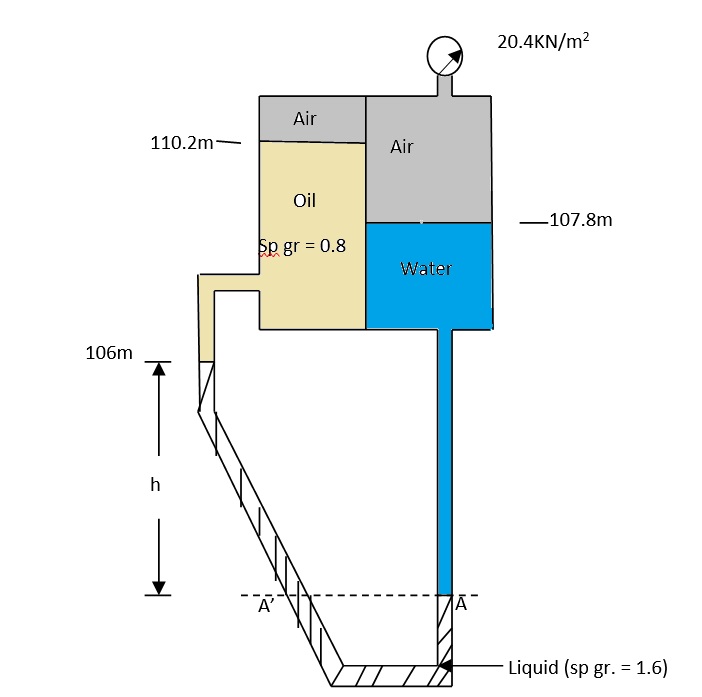
Problem Statement
Circular gate ABC in the figure is 4m in diameter and is hinged at B. Compute the force \( P \) just sufficient to keep the gate from opening when \( h \) is 8m.

Solution
1. Area of the Circular Gate
The area of the gate is:
\( A = \frac{\pi \cdot 4^2}{4} = 12.56 \, \text{m}^2 \)
2. Location of CG
The depth of the center of gravity is:
\( y_{\text{CG}} = 8 \, \text{m} \)
3. Resultant Force on the Gate
The hydrostatic force on the gate is:
\( F = \gamma \cdot A \cdot y_{\text{CG}} \)
\( F = 9810 \cdot 12.56 \cdot 8 = 985708 \, \text{N} = 985.708 \, \text{kN} \)
4. Moment of Inertia about CG
The moment of inertia about the CG is:
\( I_G = \frac{\pi}{64} \cdot 4^4 = 12.56 \, \text{m}^4 \)
5. Line of Action of Forces
The vertical distance of the center of pressure from the free surface is:
\( y_{\text{CP}} = y_{\text{CG}} + \frac{I_G}{A \cdot y_{\text{CG}}} \)
\( y_{\text{CP}} = 8 + \frac{12.56}{12.56 \cdot 8} = 8.125 \, \text{m} \)
6. Force \( P \)
Taking moments about \( B \):
\( 985.7 \cdot 0.125 – P \cdot 2 = 0 \)
\( P = 61.6 \, \text{kN} \)
Results:
- Resultant Force on Gate: \( F = 985.708 \, \text{kN} \)
- Force Required: \( P = 61.6 \, \text{kN} \)
Explanation
- Area: The area is calculated using the formula for the area of a circle.
- Forces: The hydrostatic force depends on the depth and area of the gate.
- Moment of Inertia: Used to calculate the center of pressure.
- Moments: Taking moments about the hinge point determines the force required to keep the gate closed.
Physical Meaning
This problem highlights the principles of hydrostatic force and equilibrium on curved surfaces. Calculating the required force ensures stability and safety in hydraulic structures.



